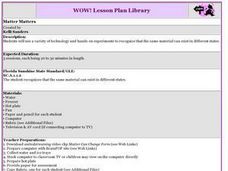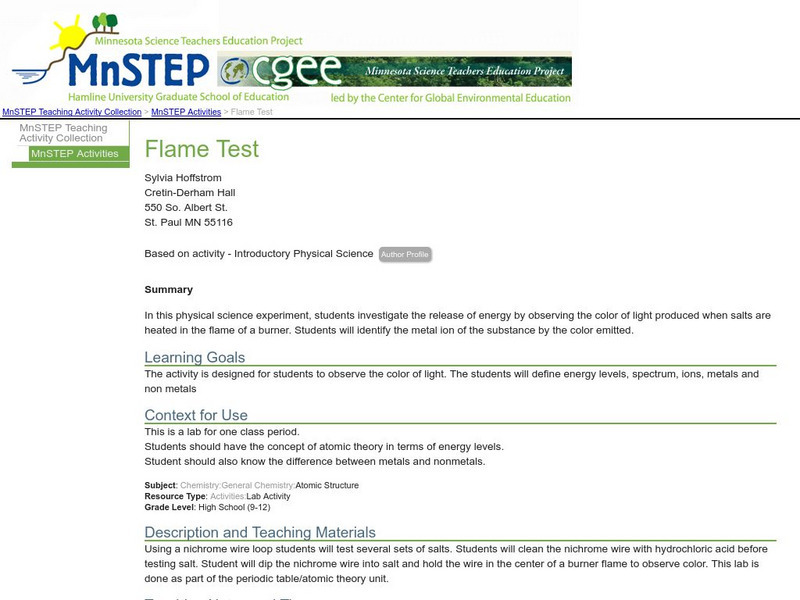Curated OER
Cool Stuff
Young scientists must place a check mark next to the answer they think is correct regarding things that are warm, cool, hard, and soft. This would be a good way to begin discussing how some things actually change states of matter...
Curated OER
For a Change
Here is a worksheet that has young scientists think about things that been changed as a result of heating and cooling, and if they can be returned to their original form. There are seven scenarios to consider, and they must choose,...
Curated OER
Heating and Cooling Curves
High schoolers experiment with a pure substance and a phase change. In this heating and cooling curves lesson plan, students study the effects of heating and cooling a pure substance to observe a phase change. They determine both the...
Curated OER
Heating and Cooling Materials
When an object is heated or cooled, a change occurs. Learners will work through this presentation and decide whether or not the changes are reversible. They learn about heating and cooling, then assess changes that have taken place. This...
Curated OER
Sand or Rock? Finding Out From 1,000 km
Young scholars observe how measurements are made with different instruments. In this remote sensing activity students investigate the physical state of surfaces including the surfaces of the solar system.
Curated OER
The Magic of Solar Thermal: How the Sun Can Be Used to Heat Water
Learners are introduced to how the sun is used to heat water. In this solar instructional activity students identify the different types of solar water heating and demonstrate how it works.
Curated OER
Heating Crystals
Students examine the effects of heating on various crystals. They answer questions in the observation category which assess their ability to use a variety of senses to observe data in a certain way- a scientific way.
Curated OER
Matter Matters!
Second graders experiment with heating and cooling and research the states of matter (solid, liquid, gas).
Curated OER
Keeping Warm
Learners participate in an online activity to determine how objects heat and cool. They determine what objects best serve as thermal insulators.
Curated OER
Hot and Cold Colors
Students explore the effect of heating and cooling on the dispersal of food coloring in water.
Curated OER
Changing State
Students participate in an online lesson to investigate the effects of cooling and heating on water.
American Chemical Society
Middle School Chemistry: Air: It's Really There
Investigation shows that gas takes up space and has mass, and that the motion of gas molecules is affected by heating and cooling.
American Chemical Society
Middle School Chemistry: Temperature and Density
Observe how heating and cooling affect the density of water. Combine the concepts of temperature, molecular motion, and density to learn that hot water is less dense than room temperature water and that cold water is more dense.
TeachEngineering
Teach Engineering: Optimize! Cleaner Energy Options for Rural China
Students work in engineering teams to optimize cleaner energy solutions for cooking and heating in rural China. They choose between various options for heating, cooking, hot water, and lights and other electricity, balancing between the...
TeachEngineering
Teach Engineering: Zero Energy Housing
Students investigate passive solar building design with a focus solely on heating. They learn how insulation, window placement, thermal mass, surface colors, and site orientation play important roles in passive solar heating. They use...
TeachEngineering
Teach Engineering: Temperature Tells All!
Students are introduced to the health risks caused by cooking and heating with inefficient cook stoves inside homes, a common practice in rural developing communities. Students simulate the cook stove scenario and use the engineering...
TeachEngineering
Teach Engineering: Passive Solar Design
Young scholars are introduced to passive solar design for buildings--an approach that uses the sun's energy and the surrounding climate to provide natural heating and cooling. They learn about some of the disadvantage of conventional...
BBC
Bbc Schools: Ks2 Bitesize: Science: Materials: Changes in Materials
Help solve the mystery and find the missing crystal. Following the activity, read more about chemical and physical changes, and then take a quick quiz to check for understanding.
American Chemical Society
Middle School Chemistry: Moving Molecules in a Solid
Students observe and describe, on the molecular level, how heating and cooling affect the motion of molecules in a solid.
American Chemical Society
Middle School Chemistry: Molecules in Motion
Students observe, on a molecular level, how heating and cooling affect molecular motion.
American Museum of Natural History
American Museum of Natural History: Grow Rock Candy
Students can carry out an investigation using sugar and water to determine whether heating or cooling a substance may cause changes that can be observed. This activity reinforces the ideas that the properties of materials can change when...
Science Education Resource Center at Carleton College
Serc: Flame Test
In this physical science experiment, students investigate the release of energy by observing the color of light produced when salts are heated in the flame of a burner. Students will identify the metal ion of the substance by the color...
Royal Society of Chemistry
Royal Soc. Of Chemistry: Kitchen Chemistry: Chemical Changes During Cooking [Pdf]
Article, with embedded questions, describes the chemical changes that take place when meat is cooked when sugar is heated, and when fruits brown.
Other
Warmair.com: Programmable Thermostats
The virtues of programmable thermostats are discussed. Includes a section titled "Thermostat Set-back Calculation;" the visitor can enter the normal and an adjusted thermostat setting and an outdoor temperature and view the percent...




















